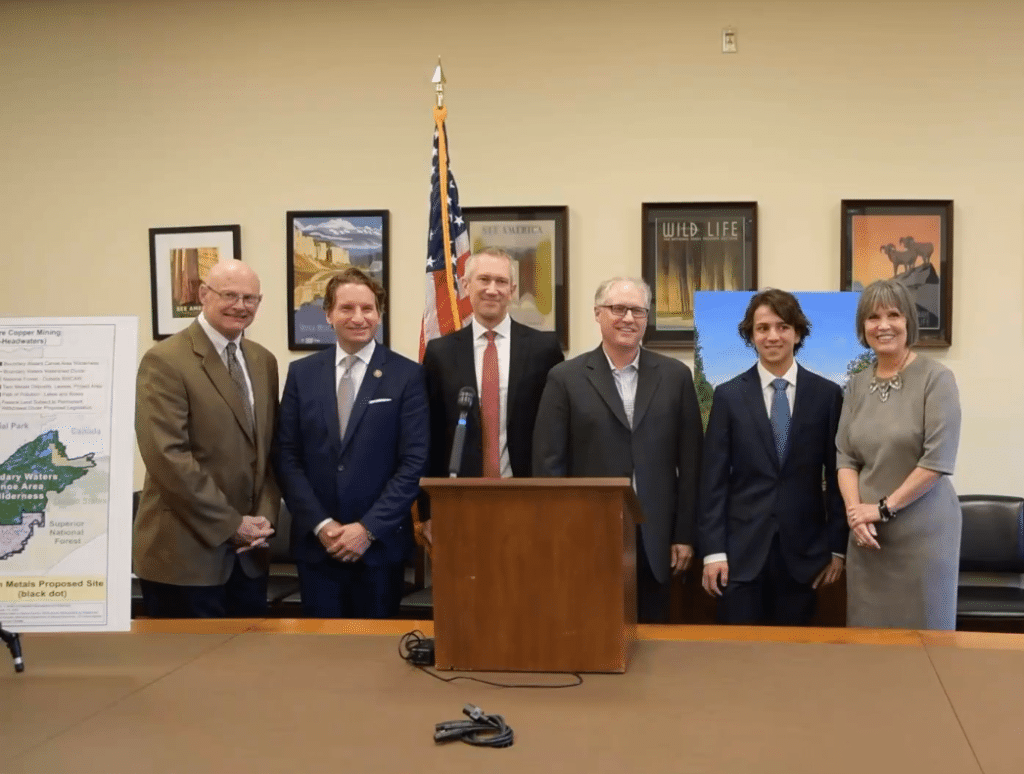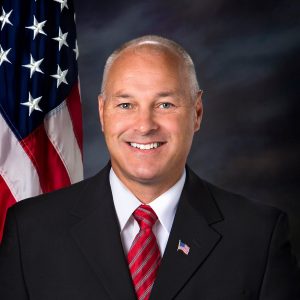
Rep. Betty McCollum of Minnesota and members of Congress introduced bi-partisan legislation today that would stop the Twin Metals mine and other possible copper-nickel projects near the Boundary Waters. The bill would block all mining activity in 234,000 acres of federal lands that ultimately drain into the wilderness.
It would essentially accomplish through Congress what President Obama attempted to do through executive action in late 2016. Obama’s efforts to withdraw the lands from mining were subsequently overturned by the Trump administration. The actions are still being debated in Washington and the courts.

McCollum and colleagues are now seeking to achieve the same protection legislatively.
“We must permanently withdraw federal lands from sulfide-ore copper mining leases to ensure that this wilderness is protected for generations to come,” McCollum said.
She listed other iconic natural landscapes, like the Grand Canyon, Bear’s Ears and Grand Staircase National Monuments, and the Arctic National Wildlife Refuge as threatened by resource extraction, and said it is “equally important” to protect the Boundary Waters.
Last month, Twin Metals, a subsidiary of Chilean conglomerate Antofagasta PLC, submitted a proposal to state and federal officials to begin environmental review. The mine would be within a couple miles of the Boundary Waters along the South Kawishiwi River southeast of Ely, posing a threat of acid mine drainage and other negative environmental effects.
Because water flows out of the Boundary Waters along the Rainy River, mines in the watershed could threaten Voyageurs National Park farther downstream, too.
Pollution prevention
H.R. 5598, the Boundary Waters Wilderness Protection and Pollution Prevention Act, is intended to “provide for the protection of the Boundary Waters Canoe Area Wilderness and interconnected Federal lands and waters, including Voyageurs National Park, within the Rainy River Watershed in the State of Minnesota.”
The legislation would not affect iron mining, or the PolyMet copper-nickel proposal, which would be located outside the watershed.
Several environmental advocacy groups signed on to endorse the bill, including Minnesota organizations such as the Campaign to Save the Boundary Waters, Friends of the Boundary Waters Wilderness, and Voyageurs National Park Association, and national organizations like The Wilderness Society, Sierra Club, and the National Parks Conservation Association.
“Today is a good day for the hundreds of thousands of Americans who love the Boundary Waters,” Said Tom Landwehr, executive director of the Campaign to Save the Boundary Waters. “Rep. McCollum’s legislation is a necessary step to protect Minnesota’s crown jewel and one of America’s great national treasures. Sulfide-ore copper mining is one of the most toxic industries in America, and doesn’t belong anywhere near the Boundary Waters.”
The only other member of Minnesota’s Congressional delegation to sign on to the bill was Rep. Dean Phillips of Minnesota’s Third District. Other authors include Florida Republican Francis Rooney, Arizona Democrat Raul Grijalva, chairman of the House Natural Resources Committee. Democrats Fred Upton of Michigan and Alan Lowenthal of California were the other authors.
Rapid response

The legislation triggered harsh reactions from pro-mining politicians. Rep. Pete Stauber, a Republican who represents northeastern Minnesota in Congress, and Rep. Tom Emmer, another Minnesota Republican, issued a joint statement blasting the bill.
“I am absolutely outraged to hear another harmful piece of legislation has been introduced to reinstate a mineral withdrawal in the Superior National Forest, once again attempting to place this vast, mineral-rich area off-limits,” Stauber said.
The first stop for the bill will be the Natural Resources Committee. Chairman Grijalva’s support of the legislation should mean it will get prompt attention.
“Sulfide mine development in our watershed threatens the pristine lakes of Voyageurs National Park — a park that preserves the vast interconnected waterways once traveled by Voyageurs and Ojibwe, and today is enjoyed by over 240,000 anglers, kayakers, houseboaters and more,” said Christina Hausman Rhode, executive director of Voyageurs National Park Association.
More information:
- H.R. 5598 – Boundary Waters Wilderness Protection and Pollution Prevention Act – Congress.gov
- H.R. 5598 Resources – Rep. Betty McCollum
Watch the announcement:

